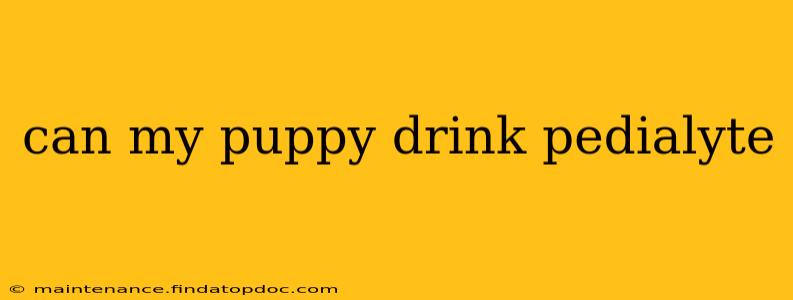Can My Puppy Drink Pedialyte? A Vet-Recommended Guide
The question of whether your puppy can drink Pedialyte is a common one among concerned pet owners. The short answer is: it depends. While Pedialyte can be helpful in certain situations, it's crucial to understand when it's appropriate and how to administer it safely. Improper use can be harmful to your puppy. This guide will provide you with the necessary information to make an informed decision.
Understanding Pedialyte and its Purpose
Pedialyte is an electrolyte solution designed for humans to rehydrate after illness, particularly diarrhea and vomiting. It replaces essential electrolytes like sodium, potassium, and chloride lost through dehydration. These electrolytes are vital for proper bodily function, including muscle contractions, nerve impulses, and fluid balance.
When Pedialyte Might Be Appropriate for Puppies
Pedialyte can be considered under specific circumstances, always after consulting with your veterinarian. These include:
-
Mild Dehydration: If your puppy has experienced mild dehydration due to vomiting or diarrhea, your vet might recommend Pedialyte as a supplemental rehydration aid. This is not a replacement for veterinary care.
-
Electrolyte Imbalance: In cases where your puppy has lost significant electrolytes due to illness, your vet may suggest Pedialyte to help restore balance. This is a serious situation requiring immediate professional veterinary attention.
When Pedialyte is NOT Appropriate for Puppies
It's crucial to understand the limitations and potential dangers of giving Pedialyte to your puppy:
-
Severe Dehydration: For severe dehydration, Pedialyte is insufficient. Your puppy needs immediate veterinary care, likely including intravenous fluids.
-
Underlying Medical Conditions: Certain underlying medical conditions may make Pedialyte unsuitable or even harmful. Always consult your vet before administering any medication or supplements.
-
Excessive Amounts: Giving your puppy too much Pedialyte can lead to electrolyte imbalances, which can be just as harmful as dehydration.
-
Unsuitable Flavors: Avoid flavored Pedialyte, as artificial sweeteners and flavorings can be toxic to dogs. Always use unflavored Pedialyte.
What are the potential side effects of giving my puppy Pedialyte?
While generally safe when used appropriately and under veterinary guidance, potential side effects of giving Pedialyte to puppies include:
- Upset stomach: Some puppies may experience diarrhea or vomiting.
- Electrolyte imbalance: Giving too much can disrupt the delicate balance of electrolytes.
- Kidney problems: In rare cases, excessive sodium intake can strain the kidneys.
What should I do if my puppy is dehydrated?
Dehydration in puppies is a serious concern. Do not attempt to treat it at home without veterinary guidance. Signs of dehydration include lethargy, sunken eyes, dry gums, and loss of skin elasticity. If you notice any of these signs, immediately contact your veterinarian.
Can I give my puppy plain water instead of Pedialyte?
For mild dehydration, offering small amounts of plain, fresh water frequently is usually sufficient. However, for more significant dehydration, water alone may not adequately restore electrolyte balance.
My puppy has diarrhea; can I give them Pedialyte?
Diarrhea can lead to dehydration and electrolyte loss. If your puppy has diarrhea, contact your veterinarian immediately. They will assess the severity and recommend the best course of action, which may include Pedialyte, but only as part of a broader treatment plan.
Is it safe to give my puppy Pedialyte for vomiting?
Similar to diarrhea, vomiting can lead to dehydration. Contact your veterinarian immediately if your puppy is vomiting. They will determine the cause and recommend the appropriate treatment, which may or may not include Pedialyte.
Conclusion:
Pedialyte should only be given to puppies under the strict supervision and guidance of a veterinarian. It is not a substitute for professional veterinary care. Always prioritize contacting your vet if your puppy shows signs of dehydration, diarrhea, or vomiting. Their expertise will ensure your puppy receives the appropriate and safe treatment.
